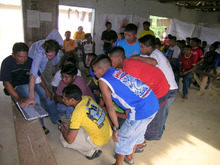 Baniwa School at the Içana River | |
| Regions with significant populations | |
|---|---|
| 7,000 (2000)[1] | |
| 5,811 (2005)[1] | |
| 2,408 (2001)[1] | |
| Languages | |
| Baniwa, Portuguese | |
| Religion | |
| traditional tribal religion | |
| Related ethnic groups | |
| Kuripako people[1] | |
Baniwa (also known with local variants as Baniva, Baniua, Curipaco,[1] Vaniva, Walimanai, Wakuenai) are South American Indians, who speak the Baniwa language belonging to the Maipurean (Arawak) language family. They live in the Amazon Region, in the border area of Brazil, Colombia and Venezuela and along the Rio Negro and its tributaries.
There are an estimated 5,811 Baniwa in Brazil, 7,000 in Colombia and 2,408 in Venezuela's Amazonas State, according to Brazil's Instituto Socioambiental,[1] but accurate figures are almost impossible to come by given the nature of the rainforest.
Baniwa Indians rely mainly on manioc cultivation and fishing for subsistence. They are also known for the fine basketry they skilfully produce.
See also
- Baniwa language, Curripako language
- Indigenous peoples in Brazil
- Indigenous peoples in Colombia
- Indigenous peoples in Venezuela
Notes
Further reading
- Robin Wright 1998 - Cosmos, Self and History in Baniwa Religion: For Those Unborn
- Theodor Koch-Grunberg 1909 - Zwei Jahre unter den Indianern: reisen in nordwest-brasilien 1903-1905("Two years among the Indians")